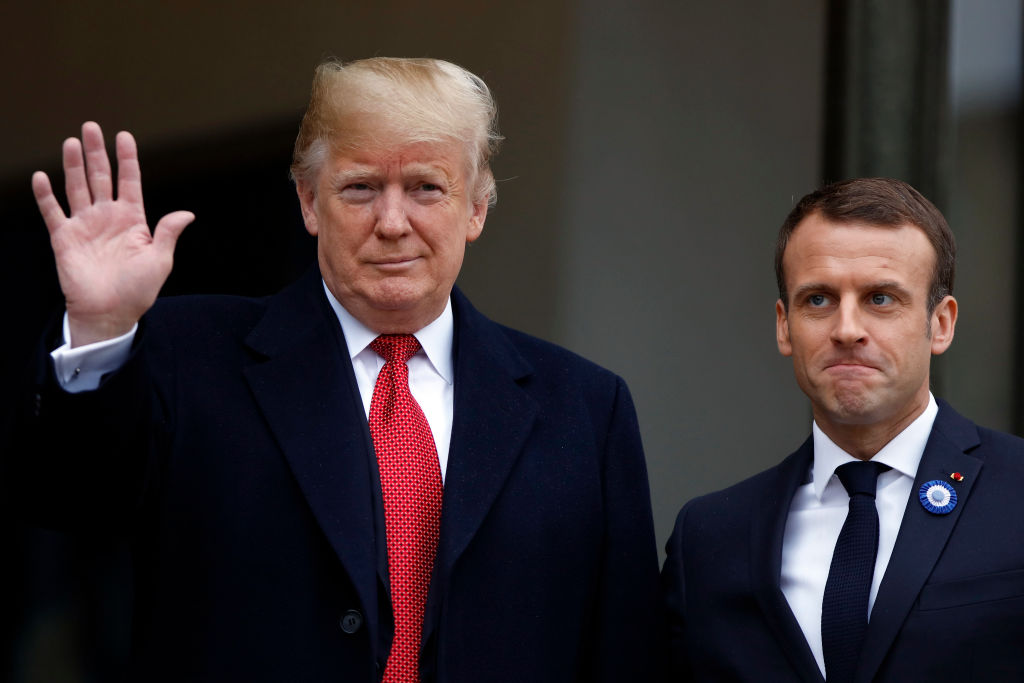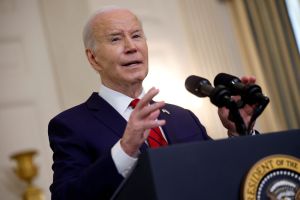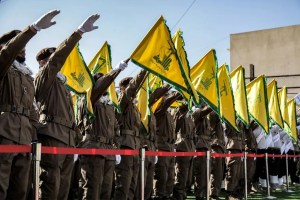So Donald Trump has come and gone, and he left behind a bemused French press. Frankly, they don’t know what to make of the American president other than he demonstrated yet again ‘his bravado and unpredictability’. The media class in France has always been close to the political establishment (hence the history of romantic liaisons between the two) and journalists have a reciprocal respect for the political class that borders on deference. That is why President François Mitterrand was able to keep both his love-child and his cancer secret until the final weeks of his 14-year presidency.
Trump does neither deference nor respect, and from the moment he touched down in France on Friday evening he appeared intent on antagonizing his host. First there was the tweet in which he declared ‘President Macron of France has just suggested that Europe build its own military in order to protect itself from the US, China and Russia. Very insulting, but perhaps Europe should first pay its fair share of NATO, which the US subsidizes greatly.’
Then he made it known he wouldn’t be attending Macron’s Peace Forum, and nor did he board the official fleet of buses that transported the world’s leaders to the Arc de Triomphe for Sunday’s service of remembrance.
Instead The Donald traveled in The Beast, the presidential Cadillac that was also seen on Saturday when he left the Élysée Palace after lunching with Macron and his wife. It wasn’t lost on the French press that as they waved off their American guest they were enveloped in exhaust fumes. For a couple who never stop talking about climate change, the look on the Macrons’ faces was priceless.
The two presidents have little in common these days, their bromance now a distant memory, and according to Le Figaro Trump ‘thumbed his nose’ one final time at his host on Sunday when he visited the American military cemetery at Suresnes on the outskirts of Paris. ‘This moment really is the best moment of these two days,’ he said during a lengthy speech.
In skipping Macron’s peace forum, Trump missed the French president and other world leaders railing against what they regard as the dangerous rise of nationalism. German chancellor Angela Merkel spoke of the threat of ‘blinkered nationalist views’, echoing the sentiments of Macron earlier in the day at the service of remembrance under the Arc de Triomphe: ‘Patriotism is the exact opposite of nationalism: nationalism is a betrayal of patriotism,’ he said. ‘By pursuing our own interests first, with no regard to others, we erase the very thing that a nation holds most precious, that which gives it life and makes it great: its moral values.’
Trump, who a few days earlier had declared himself a proud nationalist, listened to those words with a ‘stony face’, in contrast to his vivid reaction to Macron’s idea of a European army. If there was anger on the part of the American president, there would also have been amusement. If Europe can’t even come up with a coherent policy in the face of a migrant crisis, what chance does it have of assembling a functional army?
As long ago as 2002 the respected French think-tank, Institut Montaigne, warned that ‘the countries of Europe, with the exception of the United Kingdom, have proceeded to dismantle their military and diplomatic functions to a point beneath the threshold of credibility.’ France has been taking its defense more seriously for a number of years (in marked contrast to Britain), but as Le Figaro declared earlier this year: Britain and France are the ‘only European powers capable of carrying out foreign operations’. There is a respect between the French and British military that doesn’t exist elsewhere in Europe, which makes it all the more inexplicable that Theresa May hasn’t made more of this reputation in her Brexit negotiations. An EU without British military savoir-faire is a continent left dangerously inexperienced and vulnerable.
To coincide with President Trump’s visit to Paris, the left-wing Le Monde ran a series of articles on what it called the ‘crisis of Transatlantic relations’. In the weekend edition the newspaper described the ‘anxiety’ within the EU at Trump’s attitude towards Nato, and in particular his criticism of Germany’s contribution over the decades. But, says the paper, it hasn’t escaped Brussels’s notice that Italy and central Europe have been spared the president’s opprobrium because ‘his administration supports populist or anti-system movements that divide Europe’.
Macron and Merkel can inveigh against nationalism as much as they like but in doing so they demonstrate their fear that they are losing the ideological battle with voters who on the subject of sticking up for one’s civilisation are more in tune with Trump. ‘Will Europe,’ asks Le Monde, ‘which has stood firm and united in the face of Brexit and even Russia, be capable of overcoming the divisions faced with an America that is turning against it?’
It’s not just America turning against European leaders, it’s also the people they purport to lead, and when Macron criticizes those who pursue their own interests first ‘with no regard to others’, they nod in agreement. Isn’t that what the EU has done for years with its immigration policy? It’s no good the French president warning against the rise of nationalism without addressing the causes, and because he isn’t, the European elections are going to painful for progressives like him.


















